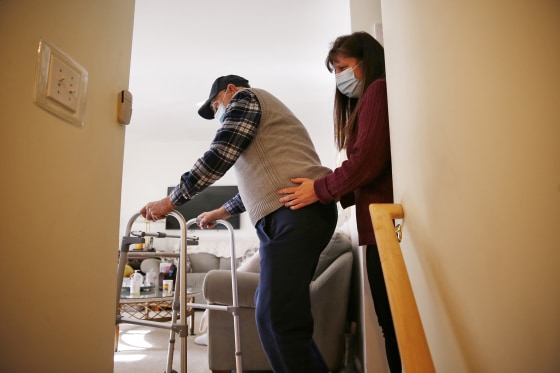WASHINGTON — President Joe Biden asked for $400 billion in new government spending for the care of the elderly and the disabled, but so far, Democrats are looking to give him less than half of that number, highlighting the difficult decisions lawmakers must make.
Democrats in Congress are racing to build a $3.5 trillion spending and tax package and are trying to balance an expansive wish list from the president and progressives with the desire of moderates to shrink the price tag.
Not all Democrats are giving up the desire to get to $400 billion in elder care funding.
Money for taking care of the elderly has become increasing salient, especially as the baby-boom generation ages. The Covid pandemic has made in-home care more appealing for many people after watching the virus hit nursing home facilities the hardest.
Senate negotiators are working with the offices of Sens. Joe Manchin, of West Virginia, and Kyrsten Sinema, of Arizona, two Democrats who have expressed concern that the overall price tag is too big, in an effort to gain their support for the elder care funding, according to Democratic Senate aides, who spoke on the condition of anonymity to detail closed-door negotiations.
The House Energy and Commerce Committee on Thursday released the details of its portion of the bill, which includes $190 billion for an expansion of Medicaid to help the elderly and the disabled stay in their homes. It’s far less than the $400 billion that Biden wanted and still below the $250 billion that Sen. Bob Casey, D-Pa., requested.
The president's proposal would expand the income eligibility to enable more people to receive personal and respite care in their home instead of having to go to a nursing home. It would also work to ensure that home health aides are paid a living wage.
There are already more people eligible for care than the funding to provide it.
Currently, more than 800,000 people are on waiting lists for home-based care assistance under Medicaid, but states don’t have enough resources to provide the services. The goal is to eliminate the waiting list and also allow more people to receive home-based care.
Even with the reduced allocation, Manchin and Sinema have expressed concerns with the program and the overall price tag of the entire bill. A source close to Manchin said that he wants government benefits like elder care to be based on income.
“He’s trying to figure out areas where you cut back,” a Democratic aide said of Manchin.
Because the program is run through Medicaid, Democrats are reassuring Manchin and Sinema that income qualifications will be included. Advocates also argue that it costs about $26,000 a year to care for a person at home, compared to more than $90,000 in a nursing home, according to a 2018 analysis by the Medicaid and CHIP Payment and Access Commission

